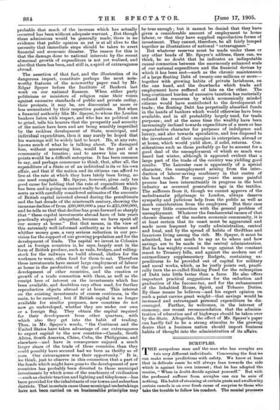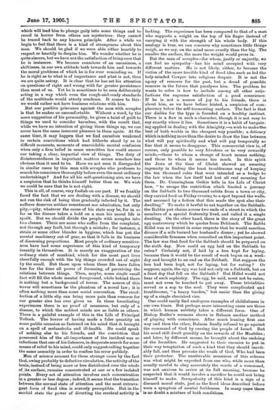T HE scrupulous man and' the man who has scruplei are
trio very different individuals. Concerning the first we can make some predictions with safety. We know at least that in delicate cases' he will always lean towards the side which is against his own interest ; that he has adopted the maxim, " When in doubt decide against -yourself." But with the professed sufferer from scruples one can be anis of nothing. His habit of straining at certain gnats and swalloiving certain camels is an ever fresh cause of surprise to those who take the trouble to follow his conduct. The mental processes which will lead him to plunge gaily into some things and to recoil in horror from others are mysterious: they cannot be traced back to any known principle. After a while we begin to feel that there is a kind of strangeness about this man. We should be glad if we were able either heartily to respect or heartily to despise him. We wonder whether he is quite sincere, but we have not the satisfaction of being sure that be is insincere. We become conscious of an uneasiness, a shiftiness, in our own attitude both towards him and towards the moral problems of which be is for ever reminding us. If he is right as to what is of importance and rhat is not, then we are quite astray. It is clear that he has set his attention on questions of right and wrong with far greater persistence than most of us. Yet he is sometimes to be seen deliberately acting in a way which even the rough-aid-ready standards of the multitude would utterly condemn. It comes to this: we would rather not have business relations with him.
But our positive grievance against the man with scruples is that he makes us uncomfortable. Without a word, by the mere suggestion of his personality, he gives a taint of guilt to things we used to consider harmless, with the result that, while we have no intention of giving these things up, we can never have the same innocent pleasure in them again. At the same time, it may happen that we find ourselves weakened in certain convictions which had hitherto stood by us in difficult moments, moments of unavoidable mental confusion when only a firm belief in some unwritten law could ensure our taking a clear, impartial view of things. The duty of disinterestedness in important matters seems somehow less obvious than it used to be. Have we not seen it disregarded in similar cases by this man with scruples who professes to search his conscience thoroughly before even the most ordinary undertakings ? And for all his self-questioning airs, we have a suspicion that he thinks himself better than us. We wish we could be sure that he is not right.
This is all, of course, very foolish on our part. If we frankly faced the fact that we are dealing with a disease, we should not run the risk of being thus gradually infected by it. The sufferer deserves neither resentment nor admiration, but only pity,—pity, whatever the cause of his state may be, for in so far as the disease takes a hold on a man his moral life is spoilt. But we should divide the people with scruples into two classes. There are some who suffer from the complaint, not through any fault, but through a mistake ; for instance, a strain or some other blunder in hygiene, which has put the mental machinery out of gear, so that it fails in its business of discerning proportions. Most people of ordinary sensitive- ness have had some experience of this kind of temporary insanity in themselves. It is merely an exaggeration of the ordinary state of mankind, which for the most part lives cheerfully enough with the big things crowded out of sight by the small. But those upon whom these fits have fallen lose for the time all power of focussing, of perceiving the relations between things. Then, maybe, some single small fact will fill the whole mental foreground, while behind there is nothing but a background of terror. The source of this terror will sometimes be the phantom of a moral law ; it is often nothing more than some social convention. The recol- lection of a little slip can bring more pain than remorse for our greater sins has ever given us. In these humiliating experiences there is no proof of meanness, but only of a disease, to which the noblest minds are as liable as others. There is a painful example of this in the Life of Principal Tulloch. The horror of having made a false quantity on some public occasion so fastened on his mind that it brought on a spell of melanoholia and ill-health. • He could speak of nothing else to his friends, and the conviction that possessed him of the all-importance of the incident was so infectious that one of his listeners, in desperate search for some means of relief to his mind, could only suggest calling together the same assembly in order to confess his error publicly.
Men of science account for these strange cases by the fact that, owing probably to defective circulation, the activity of the brain, instead of being more or less distributed over the whole of its surface, remains concentrated at one or a few isolated points. Every act of attention involves such concentration in, a greater or less degree ; indeed, it seems that the transition between the normal state of attention and the most extrava- gant form of fixed idea is, scarcely perceptible. But in the morbid state the power of diverting the cerebral activity is
lacking. The experience has been compared to that of a man who supports a weight on the top of his finger instead of carrying it with the strength of his whole body. If this analogy is true, we can conceive wig sometimes little thirigs weigh, as we say, on the mind more cruelly than the big. The smaller the surface, the more the weight would press in. .
But the man of scruples—for whom, justly or unjustly, we can feel no sympathy—has his mind occupied with very different matters. He is not likely, either, to become the victim of the more terrible kind of fixed idea such as led the holy-minded Cowper into religious despair. It is not the agony of remorse for the past, but a dread of possible remorse in the future that paralyses him. The problem be wants to solve is how to include among all other satis- factions the supreme satisfaction of a good conscience. If he is. not a source of joy to his friends, there .is about him, as we have before hinted, a suspicion of com- placency below the self-tormenting surface. The fact is that our dislike for the type is founded on a healthy instinct. There is a flaw in such a character, though it is not easy. to say exactly where it lies. Sometimes it is a habit of bargain. ing applied in dealing with the Almighty,—a wish to make the best of • both worlds in the cheapest way possible; a delicacy which is nothing more than the desire to draw the line between what will pay spiritually and what will pay temporally so fine that it seems to disappear. This commercial view is, of course, only possible to very frivolous or to very cowardly minds,—those to whom a change of heart means nothing, and those to whom it means too much. In this spirit the Jews at the time of Christ showed an amazing ingenuity in finding the least troublesome way of keeping the ten thousand rules that were intended as a hedge.to the law when the law itself had lost all real meaning fpr them. Dr. Cunningham Geikie tells in his Life of Christ how, " to escape the restriction which limited a journey on the Sabbath to two thousand cubits from a town or city, they carried food on Friday evening to a spot beyond the walls, and assumed by a fiction that this made the spot also their dwelling." To make it lawful to eat together on the Sabbath, the Rabbis put chains across two ends of a street in which the members of a special fraternity lived, and called it a single dwelling. On the other hand, there is the story of the great egg controversy which he quotes from Delitzsch. The Rabbi Hillel was so lenient in some respects that he would sanction divorce if a wife burned her husband's dinner ; yet he showed considerable firmness when consulted on this important point. The law was that food for the Sabbath should be prepared on the sixth day. Now could an egg laid on the Sabbath be eaten ? Certainly not, if laid by a hen kept for laying, because then it would be the result of work begun on a week- day and brought to an end on the Sabbath. But suppose the hen had been kept, not for laying, but for eating ? Or suppose, again, the egg was laid not only on a Sabbath, but on a feast day that fell on the Sabbath ? But Hillel would not hear of such sophistry. The egg, he said, must not be eaten, must not even be touched to put away. These trivialities served as a sop to the soul. They were complicated and troublesome, " a heavy burden," but easier than the giving up of a single cherished vice.
One could easily find analogous examples of childishness in our own times. But perhaps more interesting cases are those in which human subtlety takes a different form. One of Bishop Butler's sermons shows in Balsam another method of playing with conscience. After much leaning first one way and then the other, Balsam finally refused to go against the command of God by cursing the people of Israel. But his mind still dwelt greedily on the rewards of the Moabites ; and later, by different means, he brought about the undoing of the Israelites. He suggested to their enemies to put in their way temptation of such a kind that they should inevit- ably fall, and thus provoke the wrath of God, Who had been their protector. The unutterable meanness of this scheme was what might be expected from one who, while more than usually careful to obey accurately the words of a command, was not anxious to arrive at its full meaning, because he suspected that it would involve a sacrifice he.could not bring himself to make. Scrupulosity of .this kind is a sign of a diseased moral state, just as the fixed ideas described before were a symptom of mental feebleness. In many cases there is no doubt a mixture of both conditions.







































 Previous page
Previous page